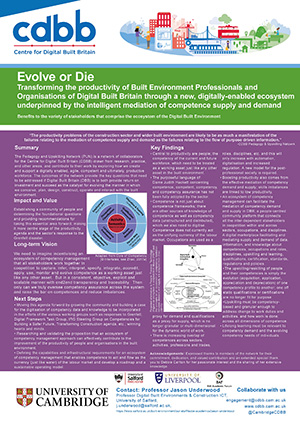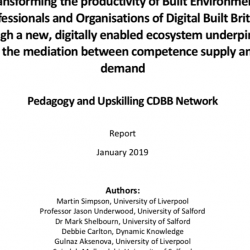The Pedagogy and Upskilling Network bid proposes to contribute to the work of the Centre for Digital Built Britain (CDBB) by exploring and addressing the research questions around how we create and support a digitally enabled, agile, effective and ultimately productive workforce.
Prof. Jason Underwood, University of Salford (presented by Mark Shelbourn)
'Pedagogy and Upskilling'
[FINAL REPORT] - https://doi.org/10.17863/CAM.40453
To capture the transformational requirements for future Built Environment professionals, a flexible and integrated competency approach will be investigated. Developing a competency approach to both professional upskilling and pedagogy has the following advantages:
- Enabling the competency, if defined properly, to be cascaded down across any built environment course, while showing the relationship with the accreditation requirements;
- Facilitating the identification of shared sets of competencies across multiple built environment courses;
- Enabling the comparison, if appropriate tools are implemented, between what the HE systems offer, and what the markets require for different professional roles;
- Providing the potential for it to be used to definite a life-long learning journey for students, including micro learning opportunities.
In relation to upskilling, the network will initially explore the current bottlenecks to the Level 2 BIM process and the current industry adoption and implementation, which in turn, will serve to inform establishing required competencies by both academia and practitioners.
The pedagogical stream will consider the transformation required in education to make it fit for developing the capabilities that will be required by future professionals to build capacity and deliver and benefit from Digital Built Britain. Such a transformation in education will not be merely concerned with just digital technologies, but more fundamentally, with the cultural and interpersonal issues that are essential for enabling value through the use of those technologies.
The following long-term objectives/outcomes are proposed:
- A comprehensive state-of-the-art critical review of built environment, engineering and architectural education in order to establish the existing landscape;
- Determine the current position and future vision in relation to other industry bodies that are fundamental in shaping the future of built environment education and training, e.g. professional institutes and their accreditation procedures, criteria, etc. aligned to facilitating digital transformation;
- Establish the bottlenecks in the adoption and implementation of Level 2 BIM within the industry in terms of both bottom up and top down;
- Determine the competencies and competency approaches to facilitate digital upskilling;
- Define the capacity gaps and propose a transitional roadmap for built environment, engineering and architectural education and upskilling to address the current digital skills gap and building capacity required for the UK to deliver and benefit from DBB.
The achievement of these objectives will serve to lay the foundations for a flexible and integrated competency approach that address the challenges of both siloed education, on the one hand, while dynamically evolving market requirements as a result of digital transformation and digitalisation, on the other hand.
Events:
Pedagogy and Upskilling Network - Follow up Workshop - 5 November 2018
Following on from the success of the opening workshop for the Pedagogy and Upskilling Research Network there will be a follow-up workshop to contribute to the next phase of the research. We are seeking wider participation to define the future research agenda for pedagogy and upskilling that contributes to the work of the CDBB by exploring and addressing the research questions around how we create and support a digitally enabled, agile, effective and ultimately productive workforce.
Final workshop from the Pedagogy and Upskillling network
The final workshop for the Pedagogy & Upskilling network was held 26th November 2018, University of Liverpool London Campus. Building on the previous two workshops and the state-of-the-art and interim report, the workshop explored the core refined proposition of the need ‘to define a robust, sustainable and collaborative competency management approach to lifelong learning of individuals, organisations, and ecosystems to facilitate the digital transformation to deliver a digital built Britain’. Implicit to this proposition is that education, upskilling/re-skilling, and learning are a lifelong process that requires many interactions across the life of individuals, organisations, and ecosystems, which all must be set in the context of competency-based evolution, i.e. competency management, assurance, analytics, etc. During the final workshop, the exploration of this proposition included further refining of the associated key research questions and focused areas in relation to the drivers and rationale, barriers/challenges, existing knowledge base and understanding, etc. The final report will present the network findings as key research questions around how we create and support a digitally enabled, agile, effective and ultimately productive workforce that enables further enhancement of the CDBB strategy.
Contact: For further information please contact Professor Jason Underwood.


